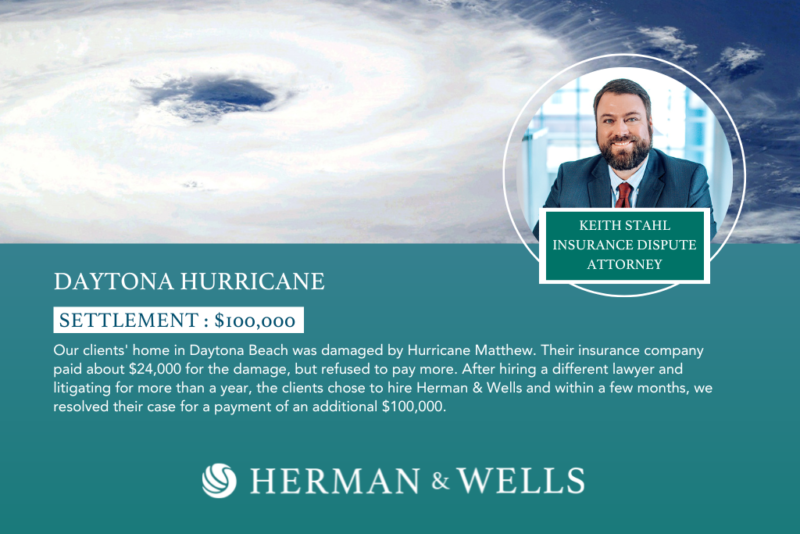
Hurricanes are a part of life in Florida. We all know that we need to be prepared for them, and have emergency supplies and insurance. But how does one prepare for the physical and emotional toll that comes with losing one’s home in a bad storm? Our attorneys have a lot of experience with hurricane insurance claims in Florida and our founding partner (Jason Herman) wanted to share several key insights with local homeowners.
When you need to file a claim for your home, it’s important that the process goes smoothly. The sooner an insurance company knows about what happened, the better! The upcoming months are going find everyone involved in insurance and restoration services heavily inundated by property damage claims from Hurricane Ian.
One thing that can help reduce some of the stress is knowing what your rights are when it comes to filing a hurricane damage claim. That’s why we’re sharing Jason Herman’s 7 rules for hurricane insurance claims in Florida. Keep these rules in mind and you’ll be on your way to getting the most out of your insurance policy following a bad storm!
Prevent further harm if you can. Board up broken windows. Tarp the roof. Hire someone to get rid of the water. This will help make your future repairs faster and less extreme, get you back on track sooner, and is also a requirement under your policy. If your property gets worse because you didn’t protect it, the insurance company may not pay for those additional damages.
Take pictures of your damaged property—both your building and your contents. Scan your receipts from any extra expenses you have for repairs, replacing things, or extra daily expenses you’re spending because your property was damaged.
Keep notes of your interactions with the insurance company. This is true even if the adjuster seems to be documenting things—they are not always on your side and they don’t always share the photos and notes that they take.
Your policy has a cooperation clause, and if the insurance company thinks you aren’t providing the documents and information it asks for, then the insurance company might try to deny your claim. It can be frustrating to gather documents in the middle of a big loss, but it’s important that you don’t give the insurance company an excuse to deny your claim.
If you think that the insurance company is making unreasonable requests, run it by a lawyer before you refuse to cooperate and risk a denial.

You might need to follow up with your adjuster to get a decision on your claim. Officially, insurance companies should make a decision within 90 days, but following up regularly will get you faster results. That said, adjusters are people, too. If an adjuster likes you, you’re just more likely to get a good result than if an adjuster doesn’t like you.
So always be polite, even when the insurance company isn’t treating you right. That might mean you have to step away from an e-mail for a few hours to cool off. What you write now may also be used in court if you have to fight your claim.
But even the best-intentioned adjusters get things wrong. That’s especially true with hurricane claims because adjusters come into the state from across the country and may not know the insurance laws here, or the local building codes. But even the most seasoned adjuster sometimes misunderstands how the law or policy works. So don’t accept any interpretation of your policy that reduces the amount the insurance company should pay you without verifying that it’s correct.

If you think the insurance company is doing something wrong, don’t just accept it. Whether it’s denying a claim, not paying enough, taking too long to get back to you, or failing to fully inspect your damage, you can challenge the insurance company’s position. You’re not going to get blacklisted or dropped by your insurance company for fighting for your rights under the policy.
Here are some ways you can challenge your insurance company:
If you’re not sure what to do or what to believe, reach out to us and we can talk. We fight bad claim decisions every day and are here to help. But some people just need straight information. We don’t charge anyone for a conversation about their claim, and a few clear answers can sometimes take away a lot of stress.
Homeowners need to remember these seven important rules if they have the unfortunate event of their home being damaged or destroyed by a hurricane and have to file an insurance claim. By following these steps, you will be in a much better position to get the most out of your insurance policy so that you can start rebuilding your life.
If your insurance company is treating you unjustly, call (727) 821-3195 today for a free claim review. We know the ins and outs of Florida hurricane insurance claims and will fight tirelessly on your behalf to make sure you get the settlement you deserve.